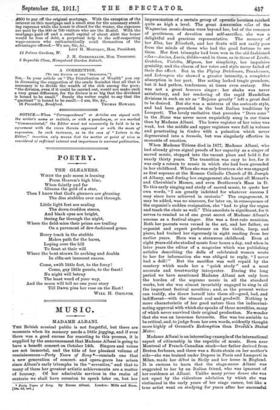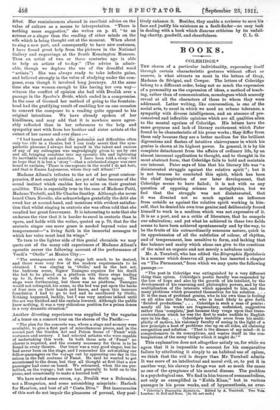MUSIC.
MADAME ALBANI.
THE British musical public is not forgetful, but there are moments when its memory needs a little jogging, and if ever there was a good excuse for resorting to this process, it is supplied by the announcement that Madame Albani is going to have a benefit concert on October 14th. Singers and voices are not immortal, and the title of her pleasant volume of reminiscences—Forty Years of Song *—reminds one that a new generation of concert- and opera-goers has arisen since Albani's early triumphs in the " seventies," and that to many of them her greatest artistic achievements are a matter of hearsay. Of her admirable services in the realm of oratorio we shall have occasion to speak later on, but her • Forty Years of Song. By Emma Alban!. London: Mills and Boon. [10s. 6d. net.] impersonation of a certain group of operatic heroines reached quite as high a level. The great Amazonrin ran of the Wagnerian music-drama were beyond her, but of the romance of gentleness, of devotion and self-sacrifice, she was a delightful and gracious representative. The memory of her Elsa, her Elisabeth, and her Sento will not easily pass from the minds of those who had the good fortune to see them. Her first triumphs had been won in the old-fashioned roles—Amin, Lucia, Gilda—and in these, as in those of Linda, Gretchen, Viotetta, Mignon, her simplicity, her impulsive geniality, and the charm of her voice and style never failed of their due effect. But in the Flying Dutchman, Tannhiiuser, and Lohengrin she showed a greater intensity, a completer absorption in her part. Her acting lacked tragic grandeur, but it had pathos, tenderness, at times even ecstasy. She was not a great bravura singer : her shake was never satisfactory, and her rendering of the rapid Handelian divisions in such an air as " Rejoice greatly " left a great deal to be desired. But she was a mistress of the sostenuto style, and had been grounded in the best Italian traditions by Lamperti. The lovely recitative that precedes " Dove sono " in the None was never more exquisitely sung in our times than by Madame Albani. The lower register of her voice was weak, but the middle and upper registers were full in volume and penetrating in timbre with a pulsation which never degenerated into a tremolo, but was singularly effective in momenta of emotion.
When Madame Titiens died in 1877, Madame Albani, who had already given signal proofs of her capacity as a singer of sacred music, stepped into the vacant place and held it for nearly thirty years. The transition was easy to her, for it was only a return to music in which she had been grounded in her childhood. When she was only fourteen she was engaged as first soprano at the Roman Catholic Church of St. Joseph at Albany, and during her engagement she learnt all Mozart's and Cherubini's Masses, and even Beethoven's Mass in D. To this early singing and study of sacred music, to quote her own words, " I am greatly indebted for whatever success I may since have achieved in oratorio." The engagement, it may be added, was no sinecure, for later on, in consequence of the organist's sudden resignation, she "had to play the organ and teach the choir as well." This anecdote is significant, for it serves to remind us of one great secret of Madame Albani's success as a festival singer. She was a first-rate musician. Both her parents were versed in the art, and her father, an organist and expert performer on the violin, harp, and piano, had trained her rigorously in sight reading from her earlier years. Hers was a strenuous childhood. Even at eight years old she studied music four hours a day, and when in later years the editor of a magazine which was publishing articles describing the dolls of celebrated women wrote to her for information she was obliged to reply, "I never had a doll!" But the sacrifice was well repaid by the mastery which made her a "quick study" and a most accurate and trustworthy interpreter. During the long period we have mentioned Madame Albani not only bore the burden of the soprano music in all the standard works, but she was almost invariably engaged to sing in all the important festival novelties ; and, as the present writer can testify, she threw herself into them all—good, bad, and indifferent—with the utmost zeal and goodwill. Nothing is more characteristic of her good nature than the indiscrimi- nating approval with which she speaks of these novelties, many of which never survived their original production. No wonder that she was an immense favourite. She was too amiable to be critical, and, to judge from her own words, evidently thought more highly of Gounod's Redemption than Dvoak's Stabat Mater.
Madame Albani is an interesting example of the international aspect of citizenship in the republic of music. Born near Montreal of French-Canadian stock—her father derived from Breton forbears, and there was a Scots strain on her mother's side—she was trained under Duprez in Paris and Lamperti in Milan, made her debut in Sicily and her home in England. It is curious to learn that the stage-name Albani was suggested to her by an Italian friend, who was ignorant of her residence at Albani. Unlike many prime donne she was not upset by the ridiculous adulation by which she was victimized in the early years of her stage career, but like a true artist went on studying for years after her successful
Her reminiscences abound in excellent advice on the *able of culture as a means to interpretation. " There is
nothing more suggestive," she writes on p. 43, " to an actress or a singer than the reading of other minds on the role which is being thought out at the moment. When about
to sing a new part, and consequently to have new costumes, I have found great help from the pictures in the National Gallery and engravings at the South Kensington Museum. Thus an artist of two or three centuries ago is able to help an artiste of to-day." (The advice is admir- able, though we deplore the use of the dreadful word
" artiste.") She was always ready to take infinite pains, and believed strongly in the value of studying under the com- poser, even though it involved long journeys. At the same time she was woman enough to like having her own way— witness the conflict of opinion she had with Dvalik over a passage in the Spectre's Bride, which ended in a compromise. In the case of Gonnod her method of going to the fountain-
head had the gratifying result of enabling her on one occasion to convert the composer to a reading quite opposed to his original intentions. We have already spoken of her kindliness, and may add that it is nowhere more agree- ably reflected than in her references to the help and sympathy met with from her brother and sister artists at the outset of her career and ever lance
. . "I bad heard much about die jealousies and difficulties often
only too rife in a theatre, but I can truly assert that the sym- pathetic pleasure I always feel myself in the talent and success of any of my colleagues was ungrudgingly given to me by one and all, bringing sunshine into my operatic life and lightening its inevitable work and anxieties. I have been told a story—let us hope that it is but a `story'—that a celebrated singer was once heard to exclaim, 'There is one soprano in the world I dc not hate, and that is Emma Lajeunesse, whom they call Albani !" "
Madame Albani's tributes to the art of her great contem- poraries, if not exactly critical, are yet of value because of the sound instinct which enables her to seize on their greatest qualities. This is especially true in the case of Madame Patti, Madame Trebelli, and Sir Charles Santley. Although she never heard Clara Novello, she acknowledges gratefully the debt she owed her at second-band, and mentions with evident satisfac- tion that whilst singing in oratorio she was often told that she recalled her great forerunner. It is interesting to note that she endorses the view that it is harder to excel in oratorio than in opera, and holds with the writer, quoted on p. 70, that for the oratorio singer one more grace is needed beyond voice and temperament—" a living faith in the immortal messages to which her voice must lend its wings."
To turn to the lighter side of this genial chronicle we may quote out of the many odd experiences of Madame Albani's operatic career the following account of the performance of Verdi's " Otello " at Mexico City :—
" The arrangements on the stage left much to be desired, and there were very few of the modern requirements to be obtained. I was singing in Mello,' and in the last act, the bedroom scene, Signor Taxnagno requires for his death the bed to be placed on a platform with three steps leading up to it, down which he rolls in his death agony. The steps were forthcoming, but there was no platform. Tamagno would not relinquish his scene, so the bed was put upon the backs of four men on their hands and knees, and upon this insecure foundation I had to go to bed and be smothered by Otello. Nothing happened, luckily, but I was very anxious indeed until the act was finished and the curtain lowered. Although the public knew nothing, it was a very ridiculous position for a prima donna in a very dramatic situation."
.Another diverting experience was supplied by the vagaries of a tenor on a concert tour on the shores of the Pacific:— '_The plan for the concerts was, where a stage and scenery were available, to give a first part of miscellaneous pieces, and in, the second part the Garden Act and Priion Scene of Faust' with costumes and scenery. I had selected artistes who were capable of undertaking this work. In both these acts of 'Faust' no chorus is required, and the scenery necessary for them is to be found in every theatre. Our tenor was a very good singer, but he 'had never been on the stage, and I remember his astonishing our fellow-passengers on the voyage out by appearing one day in the saloon in the full costume of Faust. He said he wanted to get accustomed to the dress, but they all thought at first that a new passenger had come on board. We rehearsed, when the sea per- mitted, on the voyage; but one had generally to hold on to the piano, and occasionally to make a hurried bolt.'
We have noted some errors, e.g., Dvoiik was a Bohemian, not a Hungarian, and some astonishing misprints : Harlech for Haarlem, and best of all " Costa Diva." But inaccuracies of this sort do not impair the pleasures of perusal, they posi- tively enhance. it. Besides', they enable a reviewer to save bis • face and justify his existence as a fault-finder—no easy task in dealing with a book which disarms criticism by its unfail- ing charity, goodwill, and cheerfulness. 0. L. G.







































 Previous page
Previous page